City reparations are ‘too little, too late’
Black residents left disillusioned by program’s rollout
By JESSICA MA daily senior staffer @jessicama2025
Eva Holland-Switchett still lives in the Evanston childhood home her mother bought in 1961.
She associates the house with memories of love. But Holland-Switchett, who is Black, also remembers the redlining practices her mother fought against to buy the house in the first place. For instance, her mother went to the bank to get a loan but couldn’t get it, she recalled.
About 60 years later, Holland-Switchett applied for Evanston’s Restorative Housing Program, hoping to use the housing grant to renovate her bathrooms. She said she remains frustrated with the process.
“With reparations, it’s hard to say whether it’s really going to happen,” she said.
Across Evanston, some Black residents said they are disillusioned by the reparations program, which seeks to compensate them for the city’s
historic discriminatory housing policies and practices. So far, 16 residents have received the $25,000 housing grant, while more than 100 residents are on the waiting list. They ask where their promised money is, as they say the program is moving too slowly. At least five people passed away before receiving their promised grants.
Recipients can use the grant to renovate their homes, assist with mortgage payments or contribute to a down payment on a new home. To qualify for the program, applicants must fall within one of three categories: Black residents who lived in Evanston between 1919 and 1969 (referred to as “Ancestors”); direct descendants of an Ancestor; or residents who submitted evidence of experiencing housing discrimination after 1969. However, only those in the Ancestor category are receiving money in the current stage of the program.
“The thing is — when are they going to distribute (the money)?” Holland-Switchett said. “I feel the city is just taking people’s private information.”
In January 2022, the Reparations Committee used a
» See ELDERS , page 6
Phishing emails hook NU students
Scams remain one of Information Technology’s greatest issues
 By LEXI GOLDSTEIN the daily northwestern @lexipgoldstein
By LEXI GOLDSTEIN the daily northwestern @lexipgoldstein
Prof. Sara Broaders probably did not recruit you for a
position as a student assistant in the Northwestern Department of Psychology. That was likely a phishing email.
On Jan. 17, Undergraduate Program Assistant Jillian Sifuentes sent an email to

Highland Park mayor talks gun laws
Rotering advocates national weapon regulation after Illinois passes ban
By PAVAN ACHARYA and AVIVA BECHKY daily senior staffers @pavanacharya02, @avivabechky
Content warning: This article contains discussions of gun violence.
On July 11, Highland Park Mayor Nancy Rotering stood in the Oval Office and spoke with President Joe Biden about the need for a federal assault weapons ban. It was just a week after the mass shooting at the Highland Park Fourth of July parade.
“This kind of carnage, this kind of devastation, lands in America’s front yard,” Rotering said. “It’s easy to be in Washington going, ‘Boy, that’s a terrible thing for that community.’ But it is the mayor, and it’s the local representatives and the school boards who are faced with this fear and faced with this violence and then deal with this horrific aftermath.”
Rotering has advocated for gun reform throughout her political career. As Highland Park’s mayor, she signed a citywide assault weapons ban in 2013 and teaches about gun
control and political advocacy at Northwestern as an adjunct lecturer. On Jan. 10, she and other gun reform advocates celebrated when Gov. J.B. Pritzker signed a statewide ban on assault weapon sales and distribution.

Though an appellate court upheld a temporary restraining order against the Illinois ban Tuesday, Rotering and Gun Violence Prevention PAC CEO Kathleen Sances said the ban still represented a significant stride forward.
Sances said the ban couldn’t have passed one year ago. It only became possible, she said, because of heavily covered mass shootings in Uvalde, Texas; Buffalo, New York; and Highland Park.
“This conflation of national things happening, and in our state, that it just created a really good public outcry,” Sances said.

“It forced our governor to come out immediately and say he supported an assault weapons ban.”
But Rotering said the statewide ban doesn’t go far enough to prevent gun violence in Illinois. According to an ABC News investigation, more than half of guns used in crimes in Illinois
came from out of state, including 16.7% from Indiana and 5.4% from Missouri.
While Rotering acknowledged that increased mental health services help prevent gun violence, she said limiting access to dangerous weapons is the key goal.
Rotering said she tries to bring gun control advocates to her classroom. She has taught Special Topics in Social Policy 351: Women and American Political Leadership, a class SESP junior Mary Slowinski said
helped many students decide they wanted to run for political office.
“I definitely got a lot more comfortable with the idea of using my voice for particular policy issues,” Slowinski said. “(The class was) really demystifying what it looks like to be a public official and the work that goes into it.”
Slowinski also said Rotering helped connect NU students with local advocates, such as Tender
» See ROTERING , page 6
students affiliated with the Psychology Department warning of a message which claimed to offer employment opportunities. The phishing emails were sent with Broaders’ name, but were not from her.
Odd email addresses, poor grammar and an urgent tone are all warning signs that an email is deceptive, according to Cofense, an email security
» See CATFISH, page 6
Safe Ride demand drives discussions
Drivers call for more shifts, students face rideshare struggles
By ZOEY SOH the daily northwestern @zzoeysoh
Some students face competition trying to get a Safe Ride on late nights.
But inside the car, some drivers say they are struggling to get shifts at all.
Northwestern’s Safe Ride service began partnering with TransitTech software provider Via in 2019 to provide students with free and safe transportation at night. Rides completed nightly have increased by 60% since the partnership began, according to University spokespeople.
Some Safe Ride drivers prefer working for the service over companies like Uber because they are paid hourly, rather than for each ride.
Driver Joe Powell has been working for Safe Ride for two years. In addition to the consistent pay, he said he enjoys the
range drivers operate in.
“Driving for Safe Ride is actually perfect,” Powell said. “The best part about it is it’s a small area, so it’s safe for me to drive in (the coverage area) at night.”
Though Powell enjoys working for Safe Ride, he said it’s sometimes difficult to find shifts.
According to a University spokesperson, drivers sign up for shifts through Via.
“There’s times when I would like to work, but I can’t because there’s no available slots.” Powell said. “It’s almost like fighting for shifts.”
While Powell also works for other rideshare and delivery services like DoorDash, Safe Ride is the only source of income for some drivers, like Elmo Elyoussoufi. Elyoussoufi also said he hopes to see an increase in Safe Ride shifts available. Not only would this result in increased income and less competition, it would also make it easier for drivers to take breaks, he said.
“Sometimes in the list, I have seven to eight students,” said Elyoussoufi. “I’m meant to finish the list, then I get (a) break.”
Elyoussoufi said he has worked
» See SAFERIDE , page 6
Thursday, February 2, 2023 High 29 Low 0 4 OPINION/Kang NU must be need-blind for everyone’s admissions
5 CITY/Student Journalism Schools implement new media literacy curriculum
Northwestern VIDEO/Room to Room Students around campus express themselves with unique clothing items INSIDE: Around Town 2 | On Campus 3 | Opinion 4 | Classifieds & Puzzles 6 | Sports 8 Serving the Northwestern and Evanston communities since 1881 Recycle Me
The Daily
Illustration by Emily Lichty
Phishing emails are often denoted by odd email addresses and fonts, poor grammar and an urgent tone, according to Cofense, an email security company.
Esther Lim/The Daily Northwestern Mayor Nancy Rotering. Rotering has advocated for gun control for more than 10 years.
ETHS students criticize lack of reparations education
By MARTHA CONTRERAS the daily northwestern @marthacontrerr

Evanston Township High School senior Aniah Roddy learned about Evanston’s Restorative Housing Program from local news coverage. But when it came to instruction on reparations in the classroom, she said she heard nothing.
“It’s something that I only hear about if I search it up,” Roddy said. “Because I spend the majority of time at my school, for us to not talk about important things like (the reparations program) when we spend hours there is very interesting to me.”
Evanston implemented the nation’s first reparations program in 2021. The first round of ongoing reparations focuses on housing assistance, but the second is set to focus on education, according to Rev. Michael Nabors. Administrators and teachers at ETHS said they’re working to add more about reparations and Black history to the curriculum, but despite that, some current and former students said they haven’t learned enough.
ETHS History and Social Sciences Department Chair Nicole Parker said students learn about reparations through class projects, mock debates and more in civics and history classes, among others. She added that reparations advocate Dino Robinson, who archives local Black history, spoke to specific ETHS classes in December about the history behind the argument for reparations in Evanston.
“I’m glad that students are exposed (to reparations) so that they can articulate what their thoughts are,” Parker said.
However, Roddy and ETHS senior Meg Houseworth said neither heard about Robinson coming to the school.
Both 17-year-olds also emphasized the importance of having more conversations about race in school, with Roddy pointing out the significance of discussing race beyond major news events.
“In Evanston and wherever we go, I think it’s important that we have knowledge on issues like these because we are living in a world where there are many problems with equality (and) racial discrimination,” Roddy said. “Just to make sure that everyone feels acknowledged
and understood and heard is so important.”
ETHS Assistant Superintendent for Curriculum and Instruction Pete Bavis said class instruction in ETHS is based on the Cultivating Awareness and Resilience in Education model, which focuses on improving conversations around race.
Bavis said the school is prioritizing working on various equity initiatives, including diversifying the faculty, equity training led by Superintendent Marcus Campbell and an evolving curriculum. Last school year, teachers petitioned to encourage District 202 to hire more teachers of color.
Bavis admitted that while ETHS strives to ensure equity, it is not there yet.
“Sometimes you can only guarantee so much on paper,” Bavis said.
Parker said this fall, ETHS is adding a new semesterlong course — History of Black Chicago — which will include the chance to explore archives and local history. She said she designed the curriculum to allow
EXHIBITION:
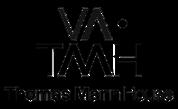
T h e e x h i b i t w a s c r e a t e d b y t h e T h o m a sM a n n H o u s e i n c o m m e m o r a t i o n o f t h e s e r i e s o f l e c t u r e t o u r s t h a t t h e N o b e l L a u r e a t e c o n d u c t e d t h r o u g h o u t t h e U n i t e s S t a t e s f r o m t h e l a t e 1 9 3 0 s t o t h e m i d - 1 9 4 0 s T h e e x h i b i t w i l l b e o n t h e g r o u n d f l o o r o f N o r t h w e s t e r n s M a i n L i b r a r y u n t i l m i d - M a r c h A n e x h i b i t h i g h l i g h t i n g M a n n ’ s c o n n e c t i o n s w i t h N o r t h w e s t e r n w i l l a l s o b e o n d i s p l a y
SYMPOSIUM:
February
“The




students to go deeper into Chicago and Evanston’s dynamic history.
The new course is the first step in offering students rotating courses that look through the lens of different identities.

Parker said a course about Latine history in Chicago may be next. She emphasized the importance of evolving the school curriculum to match the changing student body.
“Good teaching means that we put our students at the center of everything,” Parker said.

Bavis added that there is real value in helping students see themselves in the curriculum — a statement Roddy echoed when talking about the Civics course, which made her feel like she and other students of color were more included in discussion.
“It made me feel like I could do more in the world,” she said. “It definitely made me feel noticed and heard.”
Civics — a class all students are required to take during their sophomore year — also integrates the topic of reparations into its curriculum through projects on Evanston redlining, according to Bavis. However, Houseworth said she did not know much about the reparations program.
“We have not talked about reparations in the classroom, and I’m honestly not sure why that is,” she said.

Former ETHS student and current Weinberg sophomore Mia Houseworth referred to Evanston as a “facade” of progressive politics with “a lot more talk than action.”

She said ETHS needed to educate students more on the reparations program and Evanston history to “foster more important conversations and conscious voting.”
“I definitely think that Evanston’s history is something that needs to be spoken about,” Mia Houseworth said.
marthacontreras2025@u.northwestern.edu
1942/43"
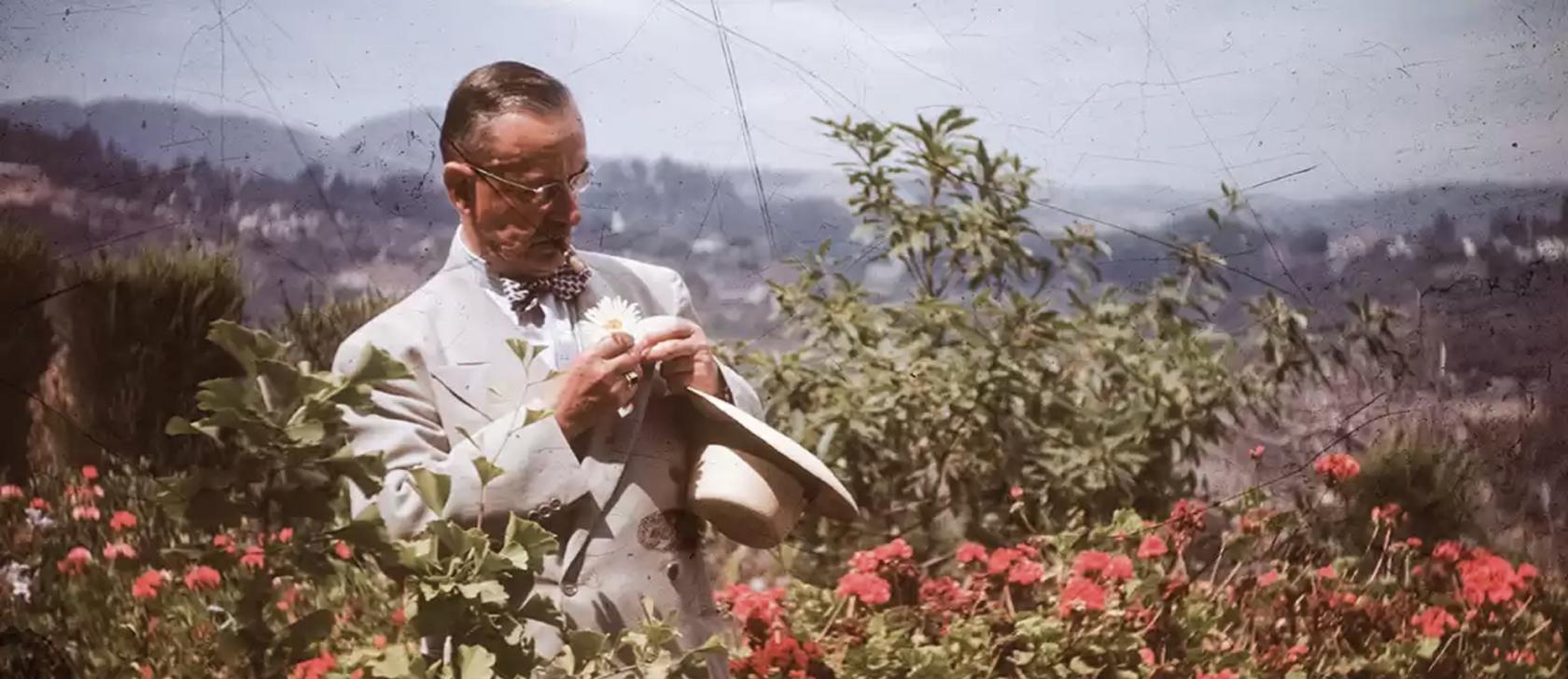
Meike

AROUND TOWN THURSDAY, FEBRUARY 2, 2023 2 THE DAILY NORTHWESTERN invites you to THE GERMAN DEPARTMENT AT NORTHWESTERN
THOMAS MANN IN EXILE, FOR SOCIAL DEMOCRACY
3 | 2-5:30pm Deering Library, 208
THOMAS MANN DEMOCRACY WILL WIN! Free and open to the public
Veronika Fuechtner
Werner Tobias Boes
‘Greatest Living Man of Letters’ Comes to Evanston: Thomas Mann and His
"How far away was L.A.?
Mann in
Palisades
“The Migrations of the Mann Family” The Daily's Email Newsletter Sign up at: dailynorthwestern.com/email Get the latest news in your inbox, on the daily.
1938 Lecture Tour”
Thomas
Pacific
Illustration by Ziye Wang
Some Evanston Township High School students said they’d like to learn more about reparations in school.
Snow or shine, they don’t stop running
 By EMILY LICHTY the daily northwestern @emilymlichty
By EMILY LICHTY the daily northwestern @emilymlichty
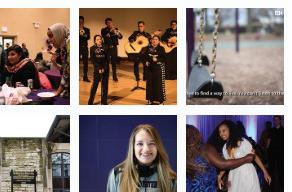
After weeks of consistent training and an almost two-hour battle with the Chicago winter, Weinberg freshman Daniel Gold crossed the finish line at his first half-marathon just as snow began to hit the pavement.
While Evanston winters often feature temperatures about 20 degrees Fahrenheit and winds averaging 18.6 miles per hour, Gold is one of many runners still training — whether outside or inside.
Gold runs around the Lakefill about twice a week, he said. Though the Evanston winter may be too cold for some, for Gold, it’s the ideal temperature.
“(The cold) was definitely a shock to the system,” Gold said. “It was hard to stay warm initially, but once you get into the race, you don’t really feel much. Honestly, it’s pretty much like normal.”
The American College of Sports Medicine said with proper winter gear and close monitoring, runners can train outside in temperatures as cold as -18 degrees Fahrenheit.
As a California native, Weinberg freshman Ethan Lee said he is surprised he can still train outdoors in the colder weather.
“I was more surprised that (runners are) able to run outdoors at all,” Lee said. “I was expecting it to be really crazy and to have to run on the treadmill every single day. Coming here, I noticed that it’s rare that the weather gets bad enough to have to run inside.”
Lee also said, however, that the cold weather requires him to hydrate more and dress for warmth.
But, some on-campus runners try to strike a balance between comfort and ease in their outfits.
SESP sophomore Maya Vuchic said she has no specific cold-weather running gear, wearing whatever is in her wardrobe to go for a run.
“In general, the way I adapt is layers,” Vuchic
said. “You have to have all of your good, warm clothes. Also, mentally preparing for the cold because it is brutal out right now.”
Vuchic is the co-founder of Solemates, an NU running club founded Fall Quarter, in which members run together twice a week. While Vuhic said the club had a successful start last quarter, it is taking a break for the winter.
Instead, Vuchic said Solemates is using the hiatus to develop a more comprehensive plan for the spring. She said she hopes the club gains new members and introduces new training methods, including yoga.
While some students continue to run outdoors this quarter, some have decided to move their training indoors for a warmer experience.
Though she sometimes runs outside during the winter — including in her home state New York — Medill freshman Moriah Pettway said she was deterred by the Evanston cold.
“We do get a lot of snow and it’s cold (in New York), but the wind (in Evanston) when you are running is just a whole other level,” Pettway said. “That definitely makes me want to go inside on the treadmill versus going outside to run.”

However, students who run indoors also face challenges, such as the redundancy of running in place.
Weinberg sophomore Sam Kliss said running indoors can require more mental strength than training outside. She added that activities such as watching reality television, can help combat boredom.

“The mental toughness on the treadmill is harder because it feels like you are going nowhere,” Kliss said. “So I have found that (distractions) help a lot.”
Other students combine indoor and outdoor settings for their running routine.
When roads are not too icy or snowy, McCormick sophomore Cate Mathews may run outdoors, but she said she typically chooses the treadmill.
In deciding whether to confront the cold or avoid it altogether, Mathews said runners
can sometimes be hard on themselves, since it is more difficult to maintain fitness in colder conditions.
“It’s been an important shift for me to remember that I don’t have to meet all those goals I have for myself at peak weather,” Mathews said. emilylichty2026@u.northwestern.edu
The Daily Northwestern www.dailynorthwestern.com
Editor in Chief Alex Perry eic@dailynorthwestern.com
General Manager Stacia Campbell stacia@dailynorthwestern.com
Holly and John Madigan Newsroom
Phone | 847.491.3222



Campus desk campus@dailynorthwestern.com
City desk city@dailynorthwestern.com
Sports desk sports@dailynorthwestern.com


Ad Office | 847.491.7206 spc-compshop@northwestern.edu







The Daily Northwestern is published Monday and Thursday during the academic year, except vacation periods and two weeks preceding them and once during August, by Students Publishing Co., Inc. of Northwestern University, 1999 Campus Drive, Evanston, IL 60208; 847491-7206.

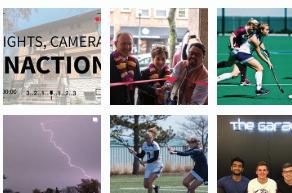




First copy of The Daily is free, additional copies are 50 cents. All material published herein, except advertising or where indicated otherwise, is Copyright 2020 The Daily Northwestern and protected under the “work made for hire” and “periodical publication” clauses of copyright law.
POSTMASTER: Send address changes to The Daily Northwestern, 1999 Campus Drive, Evanston, IL 60208. Subscriptions are $175 for the academic year.TheDailyNorthwesternisnotresponsiblefor more than one incorrect ad insertion. All display ad corrections must be received by 3 p.m. one day prior to when the ad is run.

ON CAMPUS THURSDAY, FEBRUARY 2, 2023 THE DAILY NORTHWESTERN 3 /audio Listen to The Daily Northwestern's podcasts and audio coverage of Evanston, Northwestern, mental health, culture, politics and more. dailynorthwestern.com/audio Availiable on Apple Podcasts and at: For news, updates and campus photography, follow The Daily on Instagram: @thedailynu
Seeger Gray/Daily Senior Staffer Weinberg sophomore Sam Kliss runs on a treadmill in the Blomquist Recreation Center.
out DAILYNORTHWESTERN.COM for breaking news
Check
Kang: NU must be need-blind for all admissions
students receive no need-based financial aid.
As of today, just seven U.S. universities claim to practice need-blind admissions for all applicants. Need-blind admissions is a practice where the applicants’ families income and ability to pay for college are not considered in the admissions process. Unfortunately, many universities’ claims to practice needblind admissions seem to be illegitimate.
Sixteen wealthy U.S. private universities, including Northwestern, are being sued in federal court. The class action lawsuit alleges these schools have illegally colluded to avoid providing competitive financial aid offers to students. This is serious, but unfortunately unsurprising, as too many U.S. universities are focused on profit. For this reason, we should look at the “need-blind” label with some skepticism. That said, I still believe NU should work toward achieving need-blind admission policy as much as possible.
While NU has been increasing its budget for need-based financial aid each year, the University is still openly “need-aware” for international applicants, meaning it considers a family’s financial status during the admissions process. According to the University, this is because of “limited funding for non-domestic applicants.” Currently, NU claims to be need-blind only for U.S. citizens, permanent residents and students with Deferred Action for Childhood Arrivals status. I am skeptical as to whether NU is truly “need-blind” for these students.
Despite this, I believe the next step for NU should be to expand financial aid to join the seven other schools with need-blind admissions processes for all applicants — and for them to actually mean it. While endowments don’t represent a university’s budget, NU’s endowment has grown by more than $6 billion since 2016 and has a projected endowment of about $16 billion for 2023. It is evident the University has a vast amount of financial resources it could use to increase the amount of financial aid students receive.
The biggest issue with need-aware policies is that they fundamentally harm the chances of admission for applicants who need financial aid from the University, particularly first generation, low income applicants. It is unethical to consider any applicant’s financial need in the admissions process, especially when NU has the money necessary to give out need-based aid. There is a significantly higher percentage of domestic students receiving need-based financial aid compared to international students. From the 2017-2018 to 2021-2022 school years, about half of NU domestic students received some form of needbased financial aid. In the same five academic years, on the other hand, less than 30% of international students received some form of need-based financial aid. In addition, this data shows that a plurality of NU
“It is unethical to consider any applicant’s financial need in the admissions process, especially when NU has the money to give out need-based aid,”
Need-aware admissions policies perpetuate socioeconomic inequality in the admissions process, a process which already discriminates against FGLI students in the form of standardized testing, application fees, college credit exams, private tutors and much more. For many international FGLI students, applying to U.S. universities becomes an even more difficult process, as they often face different education standards, high competition and high transportation costs to move to the U.S. and visit home.
ANTHONY
In the 2017-2018 academic year, the University reported spending about $177 million of its annual budget to provide need-based financial aid to students. In the four years since, the University has continued to increase spending on financial aid, having spent about $226 million for the 2021-2022 school year. Despite the increasing contribution from the budget each year, the University is spending a lower percentage of the endowment on providing need-based financial aid each year since 2019. In 2019, NU reported spending about $190 million to provide need-based financial aid and reported a $10.8 billion endowment, which represented just 1.76% of the endowment. By 2021, however, need-based aid represented only 1.41% of the endowment, as NU reported spending about
$226 million to provide need-based financial aid while reporting a $16 billion endowment. Furthermore, the University’s total cost of attendance has also risen rapidly, by about $12,000 since 2018.
Although implementing need-based financial aid policies can’t fix all the systematic inequalities present in the college admissions process, it can help to make college a little more accessible for international students. The huge differences between domestic versus international NU students receiving financial aid, alongside the decreasing percentage of the endowment being spent on providing need-based financial aid, are some reasons why need-blind admissions for all applicants is imperative.
Need-blind admissions for all students — domestic and international — can make a huge impact in increasing socioeconomic diversity and helping students receive the financial aid they need to attend the University. I believe NU, with its growing endowment yet poor funding for international students, has been intentionally barring many international students from attending. The potential decision to practice need-blind admissions for everybody would have an enormous positive impact here. Furthermore, it could potentially convince other U.S. universities to do the same, leading to more socioeconomic equality in U.S. higher education.
Anthony Kang is a Communications junior. He can be contacted at anthonykang2024@u.northwestern. edu. If you would like to respond publicly to this op-ed, send a Letter to the Editor to opinion@ dailynorthwestern.com. The views expressed in this piece do not necessarily reflect the views of all staff members of The Daily Northwestern.
Ortiz: My take on Chicago’s DSA candidates for council
Roushaunda Williams and Patrick Nagle. While I can see the runoff going to any two of these five candidates, I predict it’ll be between Angela Clay and Kim Walz, both of whom are endorsed by influential politicians such as Governor J.B. Pritzker.
endorsements from the DSA, CTU and mayoral candidate Brandon Johnson. Unfortunately for Sanchez, he might be facing the best overall candidate in the city this cycle.
Chicago is gearing up for the upcoming municipal elections. We’ll focus on some candidates endorsed by the Democratic Socialists of America. The most likely pickups for the DSA in city council this year are in the 46th and 48th ward elections. Both wards are on the city’s North Side. Both wards contain incumbents who chose to retire. This is where the similarities end.
The 46th ward is predominately white. Running to replace Ald. James Cappleman (46th) is DSA candidate Angela Clay. She ran for the same seat in 2019 with little support but came in fourth place. This cycle, she’s running with solid backing from the Chicago branch of the DSA, the Chicago Teachers Union and Ald. Matt Martin (47th).
Four other viable candidates running against Clay are Kim Walz, 2019 runner-up Marianne Lalonde,
Running for the 48th ward is DSA candidate Nick Ward. Ward, a restaurant worker, is a first-time candidate. Like Clay, he has support from the DSA and CTU. However, Ward’s biggest rival is Joe Dunne, a housing developer in Chicago. Dunne has support from incumbent Ald. Harry Osterman (48th) and the organizations like Chicago Federation of Labor. Because of Dunne’s fundraising efforts and endorsements, I expect him to win the election.
Some DSA-endorsed candidates are most likely to lose. The 10th ward — the largest in Chicago — has a majority Latine population and borders Indiana. This ward is idiosyncratic, with a history of voting for progressives and conservatives. This election will likely come down to endorsements.
The 10th ward candidate Óscar Sanchez garnered recognition for stopping General Iron from establishing operations in his ward out of environmental pollution concerns. He’s also raised $85,000 and has
Ana Guajardo’s fundraising slightly lags Sanchez’s, giving him an edge of almost $15,000.
Guajardo has big endorsements from nearly every union chapter in Chicago, including two different Ironworker local chapters and left-leaning Service Employees International Union chapters. Most importantly, she is endorsed by Jesús “Chuy” García, which will likely be the deciding factor in Guajardo’s win.
The last two DSA-endorsed candidates are Ambria Taylor in the 11th and Warren Williams in the 30th ward. I don’t think either of them has a chance to win because they face strong opposition and do not match the ward’s demographics.
Despite Taylor’s character and work ethic, she’s a left-leaning, white woman running in the nowmajority Asian 11th ward. She is running against Chicago’s first Chinese alderperson, Ald. Nicole Lee (11th). A win for Taylor seems unlikely.
Williams’ primary opponent is Jessica Gutiérrez,
Reif: Burnt out? Embrace a culture of less
organizations, do volunteer work, participate in professional internships, play sports and take part-time jobs. And then some. This whirlpool of activities, coupled with the stress of the modern world, can drive them to the point where they need to seek help from mental health resources.
In a Jan. 22 article, two Weinberg sophomores stated that Northwestern students “lack mental health resources at an institution with a culture of perfection.” When I was a student at NU, I too felt the pressure for perfection but just in terms of my academics. To cope with the increased pressure, the University should improve mental health resources by increasing funds and staff for Counseling and Psychological Services, as well as the Center for Awareness, Response and Education programs. As a non-profit — with a $14.4 billion endowment and a positive margin of $138.7 million — NU surely has adequate funds to deal with this. But why does the University need to show a positive margin anyway?
Confronting a culture of perfection is a much more complex and difficult task. Based on what I’ve read in The Daily, NU students today feel compelled to be “Everything Everywhere All At Once,” but without that movie’s 11 Oscar nominations. In addition to their academic studies, students join campus
Some pressure is a necessary part of campus life. Every generation of NU students — including mine in 1964 — has faced intense academic pressure. This is appropriate for an institution like NU, which has consistently been ranked among the top 10 U.S. universities and colleges, according to U.S. News. Students on scholarships must devote much of their time to the craft that earns them a place at NU, be it a sport, the arts or academia. Many low- and middle-income students must also take part-time jobs to help finance their education at a school with an annual tuition tab of $60,000 and rising, as well as a total yearly cost of more than $80,000. NU can ease their pressure by increasing financial aid, which could be funded by the University’s adequate financial resources.
Non-Greek organizations embrace activities that range from performing arts to political protests. While they may enrich students’ lives, they can also drain students’ energies and place onerous demands on their time.
Before joining, students should ask themselves: Is sacrificing my personal time worth the benefit I might gain from sharing in a collective experience? If the answer is no, don’t do it. But because of the strong impact of imposter syndrome, NU students face a dilemma — they feel like they have to forfeit their personal time. But, being at an elite school like NU should be enough.
NU’s passion for perfection is reflected in the school’s slogan: “AND is in our DNA.” It’s time to adopt a healthier tagline: “Less is a lesson we learned.” I’m not advocating that NU foster a culture of slackers, but it should not push students to a breaking point and beyond. Studies are important, but students can still get a life while getting an education.
Hit the pause button when you’re not hitting the books. Stop trying to be “Everything Everywhere All At Once” — that only works in the movies. Consider doing less — you might find it can lead to a more rewarding and saner college experience.
Richard Reif is a Medill alum. He can be contacted at Dick.reif@gmail.com. If you would like to respond publicly to this op-ed, send a Letter to the Editor to opinion@dailynorthwestern.com. The views expressed in this piece do not necessarily reflect the views of all staff members of The Daily Northwestern.
who nearly beat incumbent Ald. Ariel Reboyras (30th) in 2019. She is also the daughter of former U.S. Rep. Luis Gutiérrez (D-Ill.), who was the only Latine representative from Chicago until 2018. Beating Jessica Gutiérrez would be hard enough for another Latine candidate to win, so for Williams, who does not publicly identify as such, does not really stand a chance.
The 2023 Chicago municipal elections are shaping up to be fascinating. The DSA-endorsed candidates will have a tough fight on their hands, but some of them have a good chance of making it to the runoff. While the election results are hard to predict, it’s essential to keep an eye on the various candidates and their respective campaigns, as these elections will significantly impact Chicago’s future.
Sterling Ortiz is a SESP fifth-year. You can contact him at sterlingortiz2022@u.northwestern.edu. If you would like to respond publicly to this op-ed, send a Letter to the Editor to opinion@dailynorthwestern.com. The views expressed in this piece do not necessarily reflect the views of all staff members of The Daily Northwestern.
The Daily Northwestern Volume 145, Issue 7
Editor in Chief Alex Perry
Opinion Editor Kadin Mills
Assistant Opinion Editors
Loretta David Yiming Fu
Managing Editors
Seeger Gray
Joanne Haner Angeli Mittal Olatunji OshoWilliams
Kara Peeler Nicole Tan
LETTERS TO THE EDITOR may be sent to 1999 Campus Drive, Evanston, IL 60208, via fax at 847-491-9905, via e-mail to opinion@ dailynorthwestern.com or by dropping a letter in the box outside The Daily office.
Letters have the following requirements:
• Should be typed and double-spaced
• Should include the author’s name, signature, school, class and phone number.
• Should be fewer than 300 words They will be checked for authenticity and may be edited for length, clarity, style and grammar.
Letters, columns and cartoons contain the opinion of the authors, not Students Publishing Co. Inc. Submissions signed by more than three people must include at least one and no more than three names designated to represent the group.
Editorials reflect the majority opinion of The Daily’s student editorial board and not the opinions of either Northwestern University or Students Publishing Co. Inc.
Join the online conversation at www.dailynorthwestern.com
THURSDAY, FEBRUARY 2, 2023 4 THE DAILY NORTHWESTERN
OPINION
STERLING ORTIZ COLUMNIST ANTHONY KANG COLUMNIST RICHARD REIF OP-ED CONTRIBUTOR
-
KANG, Columnist
”
Illinois law mandates media literacy in high schools
 By EMILY LICHTY the daily northwestern @emilymlichty
By EMILY LICHTY the daily northwestern @emilymlichty
When Aaliya Weheliye started taking journalism classes at Evanston Township High School, she learned the basics of media literacy, including how to interpret news articles and websites with a critical lens.
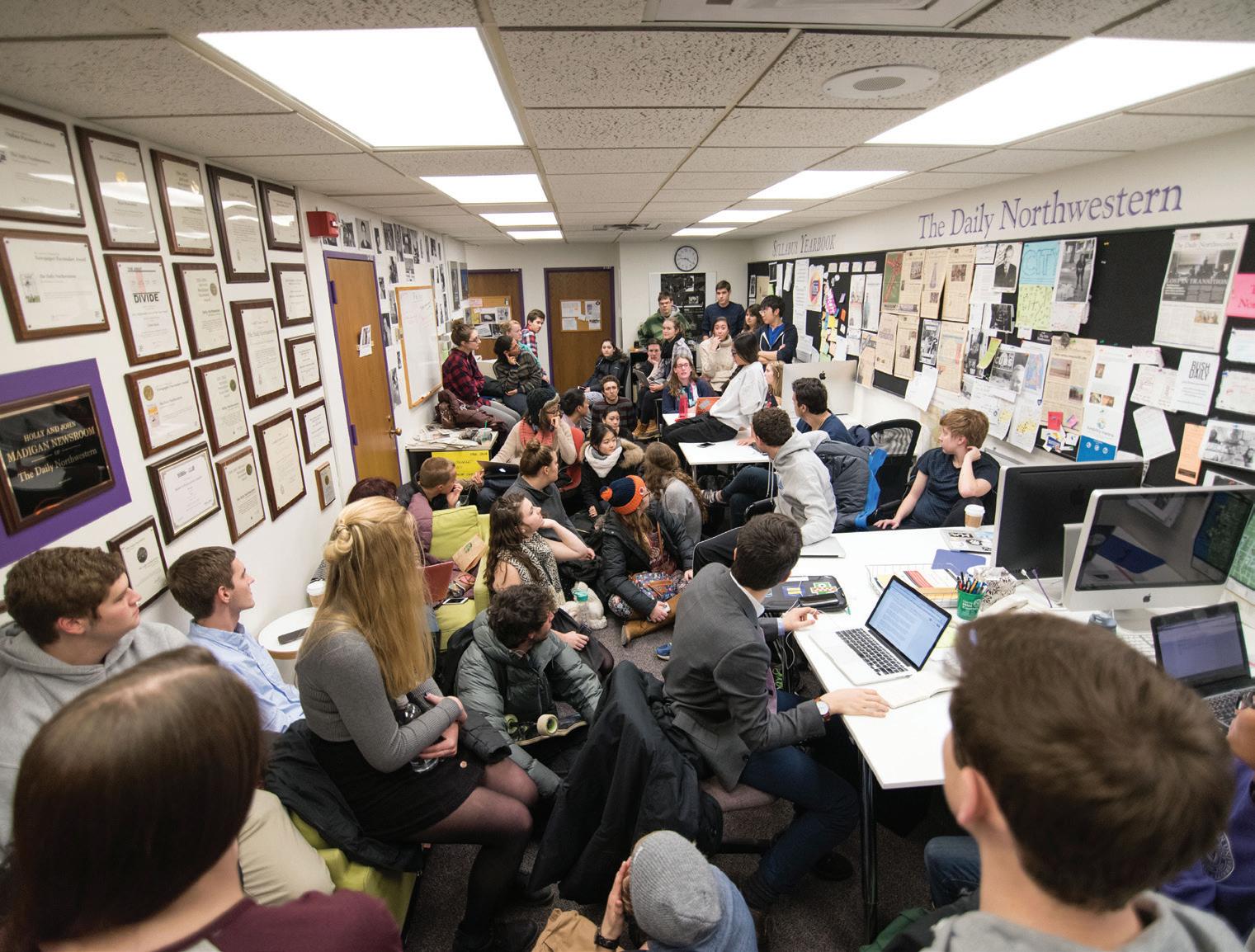
She continued to grow her media literacy skills as photo editor and opinion writer for The Evanstonian, ETHS’s school newspaper — but noticed media literacy curriculum was missing from her other classes. Especially since her generation grew up with social media, she said she worried her peers didn’t learn to approach media with enough skepticism.
“Being in a journalism class, you realize how little your other classes have taught you,” Weheliye said. “I want to do it in every class, not just journalism… I don’t feel like in my English and history classes that I am getting the kind of media literacy I was taught in journalism.”
But in July 2021, Illinois became the first state to mandate media literacy education in public high schools. Starting in the 2022-2023 academic year, Illinois high schools are required to include a unit of media literacy in their curriculum at least once per school year under the Illinois Public Act 1020055. The act defines media literacy as the ability to access, analyze and communicate information through a variety of media forms including print, visual, audio and interactive texts.
Michael Spikes is the co-founder of The Illinois Media Literacy Coalition, an organization dedicated to improving statewide media literacy education. Spikes said the act is an important step in combating misinformation in the news, adding
that school districts have asked him to come in and lead workshops on literacy.
“(The act) is making more people aware of media literacy, and that’s always a good thing.” Spikes said. “Secondly, we’re seeing that awareness is also getting to educators … It spans the state probably not as much as I would like it to, but I can see a lot of places we can go to from here.”
Though the act mandates media literacy education, it does not provide a specific curriculum or explicit instructions to teachers. The Illinois State Board of Education released guidelines and resources encouraging teachers to help students analyze, evaluate, create and communicate information through a collection of skills that build over time.




Spikes, who works with teachers to integrate media literacy into their course plans, has seen teachers asking for a more defined curriculum. However, he said he thinks flexibility allows teachers to make media literacy applicable to their own students.
“Teachers know their classrooms, they know their students very well,” he said. “(But) the demand from teachers seems to be to give (them) something they can use right now.”
Tony Streit, the board president of the National Association for Media Literacy Education, said media should not just be approached as a course to be taught one time.
Instead, it should be integrated into the curriculum and day-to-day life.
“If you treat it simply as a course, then it actually downplays its significance across the curriculum,” Streit said. “The push has not been to mandate a course but to advocate for media literacy to be integrated across curriculum and over the lifespan of a student, starting as early as preschool.”
Mayor Daniel Biss attended a summit at the White House on lead pipe replacement Friday, according to a city press release.
At the summit, Vice Presdent Kamala Harris
announced the “Get the Lead Out” partnership between the federal government, state governments, local communities, water utilities and other organizations to accelerate lead pipe service line replacement. Evanston is one of three Illinois municipalities in the partnership, along with the Village of Hazel Crest and City of Zion.
Evanston currently has more than 11,000 lead pipes as water service lines, which
In July 2021, Illinois was the first state to require teaching at least one unit of media literacy in public schools, which educators hope will be integrated throughout all grade levels and classes.

Even though it isn’t state-mandated, library media specialist Jami Rhue said she’s introducing the concept of media literacy to her pre-K students. Another member of the ILMLC, Rhue works at Providence Englewood Charter School in Chicago.
When she’s reading a picture book, for example, Rhue said she asks her students to distinguish between an illustration and a real image.
She said media literacy education should start with elementary schools and then build up to high school and college levels, rather than beginning
constitute about 77% of the water services. Exposure to lead in drinking water can cause severe developmental issues that span generations, Feinberg pediatrician Helen Binns said.
In December, Evanston received $1 million from the Illinois state government to replace lead pipes in south Evanston.
“Evanston has already taken several initial steps towards our goal of replacing all lead water services,” Biss said. “I look forward to
in later grades. While she sees this bill as a step in the right direction, she said it needs to extend to younger students as well.
“I love elementary schools, but how are we not filling in that gap to prepare (students) to even be introduced to media literacy?” Rhue asked. “(Teachers) want them to automatically dig deeper, but if we are not preparing them at the elementary school level, how does that work?”
emilylichty2026@u.northwestern.edu
building on this momentum with the support of our state and federal partners.”
The city plans to replace 160 lead service lines in 2023. The city will also implement a Lead Service Line Replace Pilot Project to replace private-side pipes — which are pipes connecting to resident’s homes — for about 150 households for free.
M A N N A T
DEATH IN VENICE
N o r t h w e s t e r n U n i v e r s i t y
T r i e n e n s F o r u m ( 1 5 1 5 K r e s g e H a l l )
T u e s d a y , F e b r u a r y 7 a t 6 p m
T H E M O V I E S
F i l m A d a p t a t i o n s o f W o r k s b y T h o m a s a n d K
G o e t h e - I n s t i t u t C h i c a g o
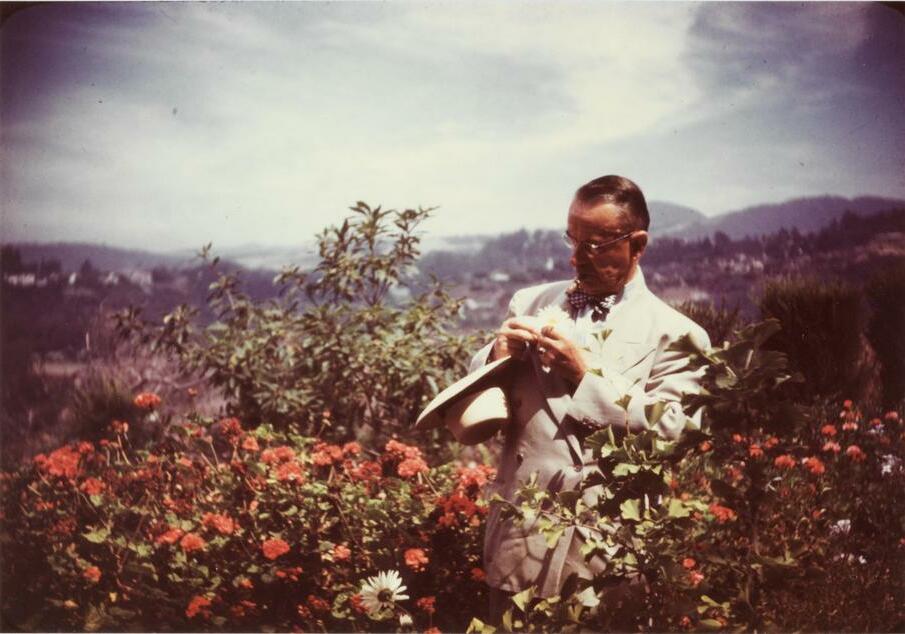
W e d n e s d a y F e b r u a r y 1 5 a t 7 p m
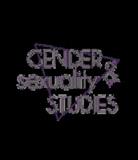
MEPHISTO
N o r t h w e s t e r n U n i v e r s i t y
T r i e n e n s F o r u m ( 1 5 1 5 K r e s g e H a l l )
W e d n e s d a y , M a r c h 1 a t 7 p m
THURSDAY, FEBRUARY 2, 2023 THE DAILY NORTHWESTERN 5 Get real-life experience.
for The Daily Get real-life journalism experience. In class, you'll learn how to write an event story or produce a video. At The Daily, you'll interview people about actual news and get practice writing for your peers and neighbors. You'll chase stories against the pros and build your skills under deadline. And you'll have fun along the way. Daily alumni go on to work for major news outlets, including: The NewYork Times, USAToday, Sports Illustrated,TheWashington Post, ESPN,TheWall Street Journal,Deadspin,People, and Vox Contact us for more information: EMAIL joinus@dailynorthwestern.com OR VISIT dailynorthwestern.com T h e s e r i e s s u p p l e m e n t s t h e t r a v e l l i n g e x h i b i t T h o m a s M a n n : D e m o c r a c y W i l l W i n ! o n d i s p l a y o n t h e g r o u n d f l o o r o f N o r t h w e s t e r n ’ s M a i n L i b r a r y f r o m l a t e J a n u a r y t o m i d - M a r c h LOTTE IN WEIMAR
Work
l a u s M a n n A l l f i l m s w i l l b e s h o w n w i t h s u b t i t l e s a n d t h e s c r e e n i n g s a r e f r e e a n d o p e n t o t h e p u b l i c
Illustration by Emily Lichty
Casey He
Mayor Daniel Biss goes to White House summit on lead pipe replacement
company.
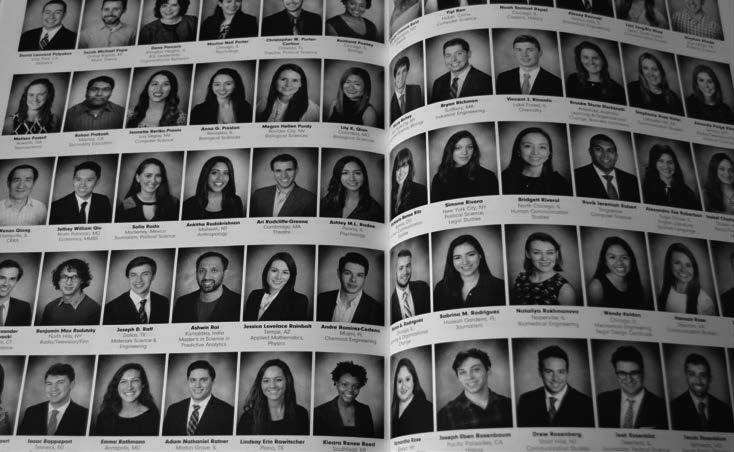
Due to public University directories, the community is far from immune to phishing messages, said Nowell Arnold, deputy chief information security officer at NU.

“(Scammers) will craft that phishing attempt and pretty much blast it to anybody and everybody or to get, you know, some cross section of people who are gonna respond,” Arnold said. “Whether they’re in the philosophy or psychology or chemistry or whatever department, someone’s going to respond.”
Students are encouraged to ignore phishing emails and report them to the Information Technology department, he added.
IT is notified about new phishing attempts daily, Arnold said. A record of phishing attempts, along with other web security resources, can be found in The Phish Dish, a section of the IT website.
Weinberg senior Camila Hirani said she receives about five phishing emails a month, once getting 20 in one month. She said some emails list other recipients who are often other NU students named Camila.
“It feels like, to me, that someone has access to a Northwestern directory and they’re just copying and pasting chunks of names and putting them in,” Hirani said.

Students like Hirani, who are involved in oncampus research, may be more susceptible to receiving phishing emails.
ELDERS
From page 1
ping-pong ball machine to randomly select an order for those in the Ancestor category to receive their money.
Rose Cannon is one of the founding members of Evanston Rejects Racist Reparations. The group demands that the program be re-evaluated and more responsive to the entire Black community, according to its Facebook page. Cannon said Evanston reparations are moving at “turtle speed.”
“I know people who have their numbers and they’re waiting,” she said. “It’s tricky, and it makes people unhappy.”
Last fall, Holland-Switchett received a form to designate who would receive the benefits in the event of her death or sudden incapacitation.
Ald. Devon Reid (8th), who serves on the Reparations Committee, said the form aims to ensure other family members could still benefit from the program in such a case.
But Holland-Switchett called it the reflection of the program as a “farce.” If the city planned to distribute the money soon, she said, there shouldn’t be a reason to designate a beneficiary.
“If you’re here today and gone tomorrow, the next
Classified Ads
THE DAILY NORTHWESTERN is not responsible for more than one incorrect insertion of an ad. Corrections must be received by 10am on the day before ad runs again, call 847-491-7206. All
Classifieds must be paid in advance and are not accepted over the phone. To run online, ad must run in print on same day. The Daily does not knowingly accept misleading or false ads and does not guarantee any ad or claim, or endorse any advertised product or service. Please use caution when answering ads, especially when sending money.
It is the policy of The Daily Northwestern to accept housing advertising only from those whose housing is available without discrimination with respect to sexual orientation, race, creed or national origin. The presumption is therefore, that any housing listing appearing here is nondiscriminatory.
According to Arnold, the majority of phishing emails sent to the NU community are a “research assistant needed” scam or a secret shopper scam, in which scammers try to convince recipients they will be paid to shop for someone else.
“When the fraudsters are somewhat successful, they’ll just keep doing it,” Arnold said. “They’re gonna go where the money’s at, unfortunately.”
Arnold said some students do get roped into scams and are advised by IT to file reports with University police and through Google’s reporting system.
But some students, like Weinberg junior Rakin Hussain, know a scam when they see one.
Hussain said he responded to a phishing email in Summer 2021 for a week as a joke, before halting the bit after the phisher assigned him to retrieve Bitcoin from an ATM machine. He said he was motivated by curiosity at the time but now ignores phishing attempts.
“I don’t even like, entertain them,” Hussain said. “I just see them, and I’m like, ‘they’re still doing that?’”
Phishing is, however, one of IT’s biggest issues, partially because the department does not have much control over the messages, according to Arnold.
He added that fraudsters sometimes continue their scams on other email addresses, over text or via WhatsApp, which makes it more difficult for IT to intervene.
“(Students) should follow the old adage: if it’s too good to be true, it probably is,” Arnold said. lexigoldstein2026@u.northwestern.edu
person may not even (receive the money). So where’s the money going to go?” Holland-Switchett asked. “I’m not building hopes upon the program.”
In November 2019, the city aimed to fund the program through the city’s 3% cannabis sales tax — but, it was found to be an insufficient source of revenue, according to Reid. The estimate relied on having three dispensaries, he said, but the city currently only has one recreational dispensary.
“Most folks who were supportive of reparations anticipated that we would be contributing $10 million over 10 years — about a million dollars a year,” Reid said. “We have not been able to do that thus far.”
To catch up, the city decided to allocate money from real estate transfer tax revenue in addition to the cannabis sales tax revenue, according to Reid.
“On top of the $3 million from real estate transfer tax revenue for this year, we’ll be doing a million dollars a year for the next seven years (from the real estate transfer tax revenue), which brings us up to $10 million,” he said.
Reid, Ald. Bobby Burns (5th) and Ald. Krissie Harris (2nd) are pushing to find funding to pay everyone in the Ancestor category, Reid said. This year’s funding should be sufficient to do that, he said.
Evanston Live TV owner Meleika Gardner said the city needed a solid plan before moving forward with
THE DAILY NORTHWESTERN is not responsible for more than one incorrect insertion of an ad. Corrections must be received by 10am on the day before ad runs again, call 847-491-7206. All

Classifieds must be paid in advance and are not accepted over the phone. To run online, ad must run in print on same day. The Daily does not knowingly accept misleading or false ads and does not guarantee any ad or claim, or endorse any advertised product or service. Please use caution when answering ads, especially when sending money.
HELP WANTED ADS are accepted only from advertisers who are equal opportunity employers. The presumption, therefore, is that all positions offered here are available to qualified persons without discrimination on the basis of race, color, religion, national origin, sex, sexual orientation, marital status, age, handicap, or veteran status.
ROTERING
From page 1
Youth Foundation founder Delphine Cherry.
“I have lost kids to gun violence,” Cherry said. “I go speak on that piece from a mother’s perspective of losing children to gun violence.”
Cherry said she applauds Rotering for her efforts to highlight the abnormality of gun violence in her curriculum.
Even though Illinois has now passed an assault weapons ban, advocates like Cherry and Rotering
SAFERIDE
From page 1
for up to two to three hours nonstop before having a 30 minute break.
According to Via, there are currently up to 10 drivers working for Safe Ride each night. The number of drivers and shifts change according to rider demand, Via told The Daily in an email. The number of rides has varied from 732 to 2,606 per week so far this academic year, due to events and changes in weather. There can be as many as 645 rides per day.
Some students are also hoping for an increase in Safe Ride services.
Weinberg sophomore Defne Deda said she uses Safe Ride once or twice a week when returning from the library or a friend’s dormitory.
Safe Ride’s 2022 survey reported that
the program in the first place. Though she’s not involved with Evanston Rejects Racist Reparations, she, too, thinks Evanston hasn’t approached reparations well.
“People want to know the (answer to the) number one question: Where’s their money?” Gardner said. “Why did you make a commitment to do a reparations program when you had no solid plan of where the money was going to come from to fund it?”
Ultimately, Cannon said she does not consider the program to be reparations.
She pointed out that it does not meet the United Nations’ five-point description of full reparations: cessation, restitution and repatriation, compensation, satisfaction and rehabilitation.
“To me, reparations would be something that would close the racial wealth gap that my people have suffered for nearly 400 years,” Cannon said. “Call it a housing program. Just don’t put the name ‘reparations’ on it.”
Gardner said she thinks direct cash payments are the only way for the program to work.
Reid supports direct cash payments as well, adding that they allow people to choose how to best support and repair their lives. He said he put in a referral — City Council’s equivalent of filing a bill — to add direct cash payments to the program.
said they’d like to see more reform, including requiring bullets to be microstamped and thus identifiable.
Rotering said she knows she can’t stop gun violence in America. But as she continues to advocate on local, state and national levels simultaneously, she said she’s trying to focus on the individual impact she can make.
“If I can save one life, I’ve saved one life,” Rotering said.
pavanacharya2025@u.northwestern.edu
avivabechky2025@u.northwestern.edu
getting to and from campus locations and social activities made up 76% of students’ most frequent use of the program.

Deda said taking a Safe Ride back to her dormitory often means she is able to avoid the cold and long walks at night.
“Overall, it’s been a good experience,” said Deda. “But I feel like it’s sometimes hard to get rides when you want because it’s really busy.”
She often waits 20 to 50 minutes for Safe Rides and has to plan rides an hour in advance if she wants to arrive at her destination on time. Deda said she wants to see an increase in driver availability.
But, Deda also added that she’s had pleasant experiences with Safe Ride drivers and has developed a friendship with one driver.
“I love Zab, he’s the king,” she said. zoeysoh2023@u.northwestern.edu
“If you are currently eligible for the housing grant, you’d be able to opt into foregoing the housing grant and receive a direct cash payment,” Reid said. “That’s my vision of it.”
He said that in his eyes, the reparations program would then reopen applications, so residents could apply for direct cash payments.
Evanston resident Bruce King, who qualified for reparations, said he remembers the impact redlining and legal discrimination had on his family. In 1959, King’s mother tried to pick up his grandmother from work, but his grandmother harshly reminded his mother that Black people couldn’t go east of Sherman Avenue after 6 p.m. without being arrested, he recalled.
He compared Evanston’s reparations program to “throwing a toothpick to drowning men”: the money is too little, too late and too slow.
Correcting that horrific history, King said, will require a lot more than dollars and cents.
“The damage that was done was not just done to those who were enslaved. The damage has been ongoing,” King said. “Reparations means to repair. It would mean to address every aspect of life — education, legal, entertainment, sports, agriculture.”
jessicama2025@u.northwestern.edu
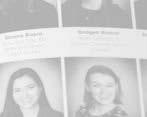
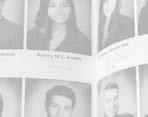
DAILY CROSSWORD
ROW, COLUMN and 3-by-3 BOX (in bold borders) contains every digit, 1 to 9. For strategies on how to solve Sudoku, visit www.sudoku.org.uk
THURSDAY, FEBRUARY 2, 2023 6 THE DAILY NORTHWESTERN CATFISH From page 1
SUDOKU DAILY PUZZLES & CLASSIFIEDS • HELP WANTED • FOR RENT • FOR SALE
DAILY
SOLUTION TO PREVIOUS PUZZLE
the grid so each
© 2023 The Mepham Group. Distributed by Tribune Media Services. All rights reserved. Level: 1 2 3 4
Edited by Rich Norris and Joyce Nichols Lewis
Complete
02/02/23
Los Angeles Times Daily Crossword Puzzle Edited by Patti Varol and Joyce Lewis FOR RELEASE FEBRUARY 2, 2023 ACROSS 1 Colbert’s network 4 Chris of “Knives Out” 9 Organic jewelry source 14 Mine product 15 Search engine name 16 Singer’s asset 17 Mexican tradition that will 62-Across? 20 “This meeting could’ve been an __” 21 Sharp 22 Monopoly payment 23 The “N” of the actor known as NPH 25 Tetra- minus one 27 Celebratory moments to 62-Across? 33 Axe thrower’s asset 34 Sleep soundly? 35 End of a piece by 65-Across 37 Espy 39 Balances (out) 41 “Paper Girls” actor Corddry 42 Thompson of “SNL” 44 Devour with gusto 46 At most 47 Shopping outing that may 62-Across? 50 Key above ~ 51 Karate school 52 Mix things up 55 Place whose state quarter features an astronaut 59 Obama daughter 62 See 17-, 27-, and 47-Across 65 Greek fabulist 66 Coach Jill who won the FIFA Women’s World Cup in 2015 and 2019 67 Minnow catcher 68 Brings (out) 69 Sierra __ 70 Rock subgenre DOWN 1 Morse __ 2 Hat part 3 Creature that may shelter clownfish 4 Shadowy places? 5 Kilmer of “Top Gun: Maverick” 6 “Oh, I got it now” 7 Wine quality 8 Not all 9 “__ Maria” 10 “Song of Solomon” writer Toni 11 Light snack 12 MBA course 13 Take a breather 18 Lost power 19 “Do __ others ... ” 24 One-third of a haiku 26 Aries symbol 27 Blade that might move quickly in a storm 28 “Song of Solomon,” for one 29 “Two thumbs up!” 30 Sophomore’s grade 31 Springy backyard apparatus 32 Kebab often served with peanut sauce 33 Question 36 NYC ave. 38 Ore-Ida nugget 40 Took to court 43 “Old Town Road” rapper Lil __ X 45 “Cross your heart?” 48 Image on a menu bar 49 Cracked open 52 Shutter board 53 Arena level 54 “Assuming that’s true ... ” 56 Stiletto, for one 57 __ of Wight 58 Norwegian capital 60 Object 61 Regarding 63 Special __: commando tactics 64 One of 10 in a lane ©2023 Tribune Content Agency, LLC By Alexander Liebeskind & Jeff Chen 2/2/23 Wednesday’s Puzzle Solved 2/2/23 Available For Rent Services Last Issue Puzzle Solved Join the yearbook team! We create the printed volume that chronicles a year at Northwestern. No yearbook experience necessary. Interested? Email: syllabus@ northwestern.edu Post a Classified! Now anyone can post and manage a classified ad. Go to: DailyNorthwestern. com/classifieds Questions? Call 847-491-7206 ORDER YOUR 2023 NU SYLLABUS YEARBOOK SENIORS, IT’S NOT TOO LATE TO RESERVE YOUR COPY AT nusyllabus.com/order
Masur teaches class on abortion, reproductive health
By CASSANDRA RATKEVICH the daily northwestern @cassandraratke1
History Prof. Kate Masur had considered teaching a course on the history of female reproductive health for many years, knowing many students had not learned about the subject previously.

But, following the U.S. Supreme Court decision to overturn the landmark case Roe v. Wade in June, Masur’s mind was set.
“That decision marked a huge change in the United States, so it seemed really relevant to teach a class on it,” she said.
Masur, a recipient of the American Historical Association’s Littleton-Griswold Prize, is teaching History 393-0: History of Abortion in the United States this quarter. The course covers abortion access from the 18th century to present-day.
Masur said 14 students — including some non-history majors — are taking the course.
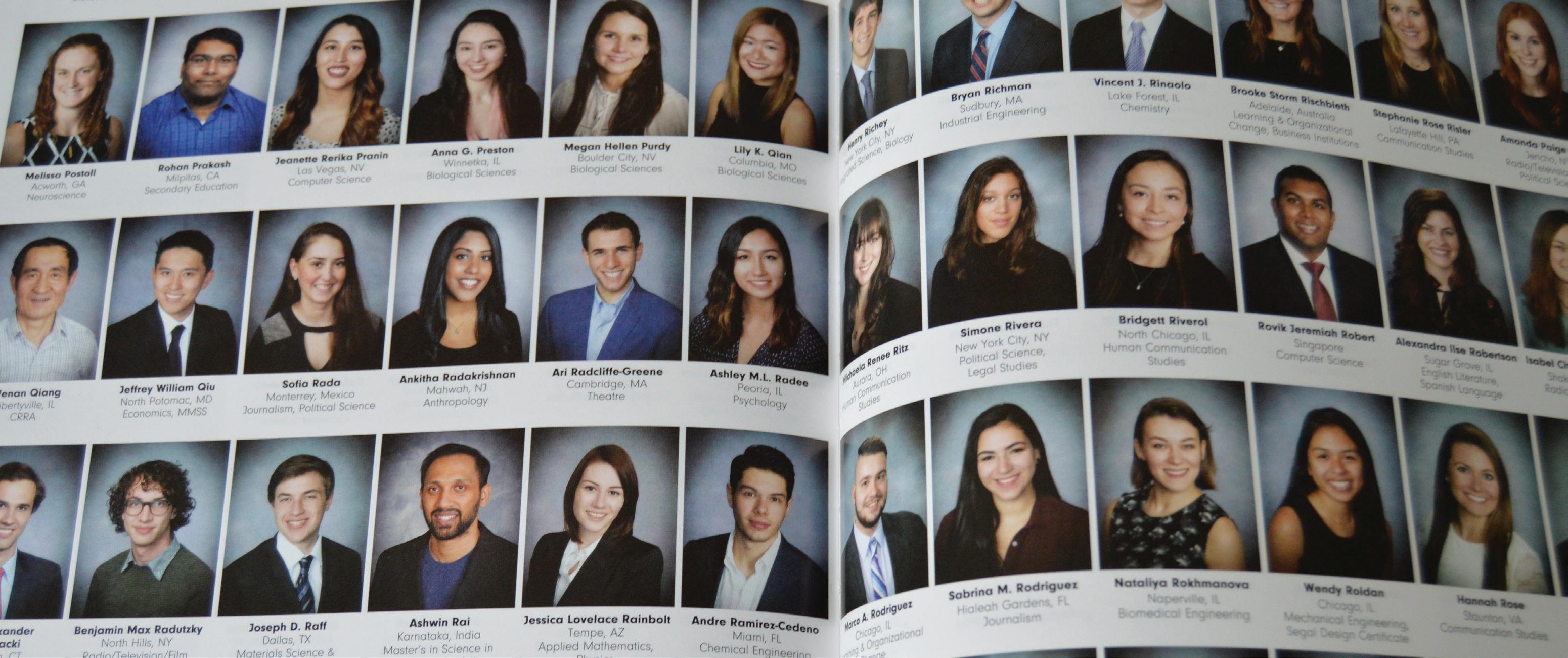
“I really wanted to have the class be as diverse as possible in every way,” Masur said. “I wanted there to be opportunities for students who are not in history to register for it.”
Prior to registering, prospective students had to email Masur to express interest and explain how the the topic of abortion history fits into their interests, academic course or previous work.
The process allowed several pre-medicine students to take the course, according to Masur. These students would not have had the chance to take the course if it was filled with history majors first — as seminars often do, she said.
“I have several students in the class wanting to be doctors — wanting to even go into women’s health — and I’m really happy they’re there, along with some history folks and a number of Medill people,” Masur said.
Medill junior Anna Lansford said she was inspired to take Masur’s course following the U.S. Supreme Court’s decision in June.
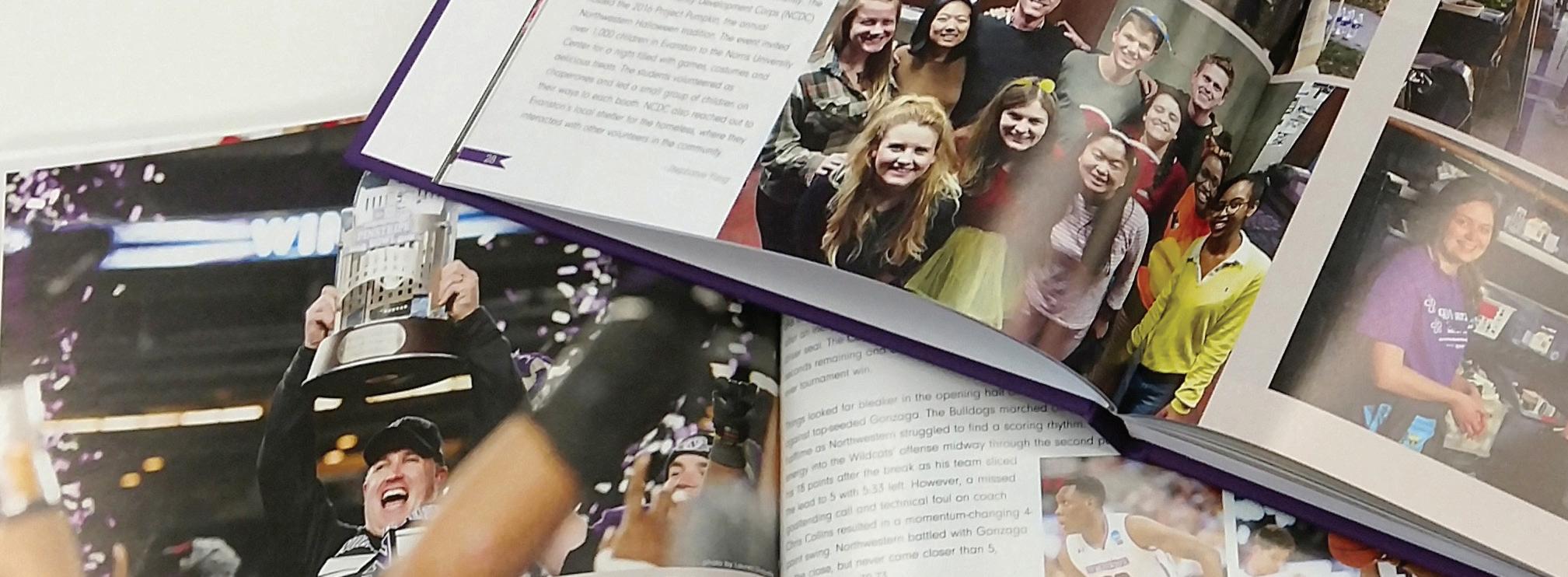
Lansford was interning for U.S. Sen. Tammy Duckworth’s (D-Ill.) office when the ruling was released.
“I got a lot of calls through my job from people all over Illinois expressing very profound feelings
of grief when Roe was overturned,” Lansford said. “And so I wanted to learn more about the history of abortion prior to Roe v. Wade.”
She said many of her other classes focus on modern-day policy, so she appreciates that Masur’s course doesn’t solely focus on current events.
However, Lansford added that she hopes the class will draw more male-identifying students in the future.
“Conversations about abortion shouldn’t be held only in predominantly women’s spaces,”
Lansford said.
Medill freshman Simone Garber said the smaller class size lessened the “hierarchy” with the professor-student dynamic.
Garber added that she took the course because she is passionate about feminism and abortion.

“I’m learning a lot now that I haven’t known before, so I’m definitely being humbled but in the best possible way,” Garber said.
Masur said she originally planned to go on leave for research this academic year but
postponed her absence for multiple reasons, including her desire to teach the course on abortion history.
She plans to take her leave next academic year, she said, but would like to teach the course again when she returns the following academic year.

“I really hope that (students) come out (of the course) with a lot more knowledge and kind of depth of knowledge of this really important issue,” Masur said.
cassandraratkevich2026@u.northwestern.edu

THURSDAY, FEBRUARY 2, 2023 THE DAILY NORTHWESTERN 7 ORDER YOUR 2023 NU SYLLABUS YEARBOOK SENIORS, IT’S NOT TOO LATE TO RESERVE YOUR COPY AT nusyllabus.com/order
Madison Bratley/Daily Senior Staffer
History Prof. Kate Masur is teaching a new seminar this quarter on the history of abortion in the United States.
Cats sputter against Iowa, end tug-of-war 112-76
By LAWRENCE PRICE daily senior staffer @lpiii_tres
The last time Northwestern and Iowa faced off, the playing field and rosters looked a lot different. The two programs were squaring off in
Indianapolis’ Gainbridge Fieldhouse for the second round of the Big Ten tournament.
Yet, unlike the Hawkeyes, who secured a first round bye and eventually won the tournament, the Wildcats welcomed the challenge after their one possession win over Nebraska the night before, 71-69.
This was their first second round appearance since 2016-17, symbolizing the different ends of the spectrum each group entered from and how far away NU was from reaching Iowa’s status. This was emphasized by the final record, 112-76 in Iowa’s favor. Matching up again 10 months later, though, the Cats (15-6, 6-4 Big Ten)
seemed to have closed the gap just in time for their rematch, entering the Iowa City contest with the secondbest record in Big Ten play. And in a foot race from the get-go, Iowa (14-8, 6-5 Big Ten) and NU were neck-andneck until the Cats sputtered, dropping the contest 86-70.
Like most of NU’s battles this season, it was a tiresome, back-andforth tug of war most of the contest. Neither team held a double-digit lead until less than five minutes remained in the entire game, mainly because of the evenly-matched play and minor runs by each group.
This was on display especially in the first half after Iowa’s first takeover when first-year guard Josh Dix’s coast-to-coast acrobatic jumper and sophomore guard Payton Sandfort’s top-of-the-key three capped off their 7-0 run. After the timeout by NU, though, the Cats caught back up and took the lead from the Hawkeyes with an 8-0 run, highlighted by a mean one-handed alley-oop slam by redshirt senior Chase Audige from senior Boo Buie.
And with graduate forward Tydus Verhoeven’s one of two buckets and an Audige three, the Cats were sitting pretty up nine with less than four minutes until the break. Yet, in back-and-forth fashion, Iowa chased down NU, knotting the contest back up at 39 apiece with Payton Sandfort’s buzzer-beating three. The two groups were shoulder to shoulder.
Coming out of the break, Buie’s offensive boost gave the Cats a much-needed edge, scoring the first five points for either team. However, Buie’s play turned from blessing to curse quickly, as he picked up his third foul less than two minutes into the second 20-minute block, placing
MEN’S TENNIS
Tennis topples, will not head to ITA Nationals
By ALYCE BROWN daily senior staffer @alycebrownn
Northwestern traveled to Ann Arbor this weekend for ITA kickoff, triumphing in a 4-0 victory over Arkansas before stumbling in a tough 0-4 loss to 4th-ranked Michigan on its home courts.
The Wildcats came into the weekend off a loss to Louisville Jan. 22 and battled to play both matches tight, starting with Arkansas on Saturday.
The pairing of grad student Trice Pickens and senior Natan Spear kicked off the team’s doubles efforts, quickly and handily winning their set and protecting their own unbeaten doubles record.
NU clinched the doubles point soon after when the top duo of grad students Ivan Yatsuk and Simen Bratholm broke the final game of their set to win 7-5.
Following a convincing doubles point, the singles matches were more of a battle. Bratholm picked up the first singles point for the Cats, beating Arkansas’ Adrien Burdet in straight sets 7-5, 6-4 and finishing far before any other matches.
Graduate student Steven Forman stumbled early, giving up the first set to Arkansas’ Stefanos Savva, but he broke Savva on the last game of the second set to win the set and force a third. He made quite a comeback in that third set, dominating it 6-0 and winning the second singles point for NU.
The finishing point was snagged by junior Gleb Blekher, who won his first set1 in a tight tiebreaker and took set 2, 6-4. The Cats beat the Hogs 4-0 in a battle, pushing themselves into Sunday’s match against 4th-ranked Michigan.
The match with the Wolverines started evenly in doubles with one victory each -– Michigan picked one up early before NU’s Bratholm and Yatsuk impressively snagged one against 14th-ranked pair Andrew Fenty and Gavin Young, 6-4.
The doubles point came down to the Cats’ duo of Pickens and Spear, who lost a tight tiebreaker to end their own 4-0 unbeaten doubles record and give the Wolverines the doubles point.
Michigan came out strong in singles, but NU put up a fight. The Wolverines snagged the first two singles points rather quickly, with Bratholm and junior Presley Thieneman both falling in straight sets.
On court 2, Yatsuk fell the first set to 16th-ranked Ondrej Styler, but dominated to end the second set 6-0 and force a third. Yatsuk played Styler closely but ended up losing the third set in a tiebreaker, giving Michigan its fourth and final point to end the match 4-0.
After this loss, the Cats will not be advancing to the ITA National Team Indoor Championships, but they will be returning to Evanston after both a hard-fought win and a hard-fought loss.
NU’s leading scorer on the bench three minutes later. Although this didn’t affect the score much, as Buie stepped back onto the court while the Hawkeyes held a one-point lead, the rest of the Cats were maxed out. From nearly the 11-minute mark, when Buie reentered, to the first double-digit lead of the contest, Buie scored all but two of NU’s points. Even though these baskets were effective, Buie needed more help from his fellow Cats, while the Hawkeyes mastered their teamwork, sharing the wealth five-fold, with five players scoring in that time span. Ironically, by the end of the game, they finished with five players in double figures — two with a 20-point bomb.
By this point in the contest, the ball was in the Hawkeyes’ court, as the Cats struggled on offense and surprisingly on defense as well. While missing five straight from the field reflecting its five for 15 shooting woes in the last 10 minutes, Iowa’s bird’s-eye view was too much for NU. Iowa didn’t take its foot off the gas pedal, not missing back-to-back shots until the end of the game — resulting in its 16-point victory.
After its loss to Michigan, most, including coach Chris Collins, viewed NU’s out of steam second half led to its demise — a possible early indication to the program’s COVID-19 outbreak. And with a similar downfall versus Iowa, playing its fourth game in eight days due to its rotated schedule may be a result of this fatigue.
With two days to rest before seeking revenge against Michigan Thursday, hopefully, the Cats can rest their legs before another tough battle. lawrenceprice2024@u.northwestern.edu
WOMEN’S BASKETBALL
Swann: Penn State to be true test
By SKYE SWANN daily senior staffer @sswann301
While Northwestern has been on a hot streak this past week, the squad aims to continue its success on the road as it battles Penn State Thursday at the Bryce Jordan Center.
The Wildcats (8-13, 1-9 Big Ten) desperately need to turn the corner as they enter the second stretch of the season. After a solid 2022 campaign — courtesy of players’ Veronica Burton, redshirt senior guard Sydney Wood and redshirt sophomore forward Courtney Shaw — NU pushed boundaries in the conference and separated themselves from other programs in the league. However, with the loss of Burton, the Cats struggled to find a consistent offensive rhythm on the floor this winter.
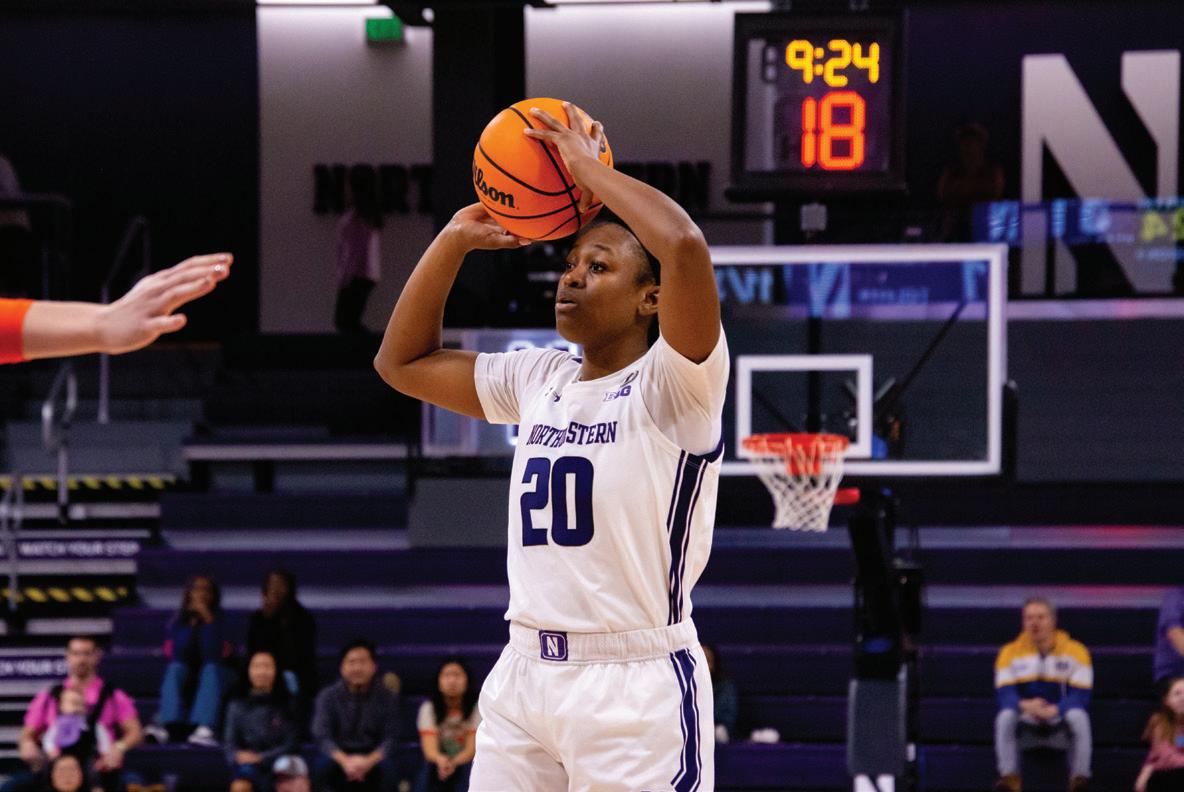
At the top of the year, coach Joe McKeown’s group went on an eight game losing streak before recording their first win over Chicago State last Wednesday. Junior forward Paige Mott, sophomore forward Caileigh Walsh and freshman guard Caroline Lau were the main facilitators of NU’s offense, whether they were working inside the post or hitting triples along the perimeter. Mott fueled this success in the next game against Wisconsin where she tallied a career-high 23 points. In her third year, Mott has flourished into her own on the floor, demanding attention from opponents and assisting her teammates inside the paint. As the Cats entered the season seeking a replacement
for Burton’s absence on the court, Mott stepped up and delivered the double digit numbers NU needed to put away those wins.
Lau is another player who has transcended into her own on the floor for the Cats. Though she is only a freshman, the guard’s agility and quickness on the court works to McKeown’s advantage to make those buzzer-beating shots before the end of a quarter. Her seasonhigh of 20 points against the Cougars is evident that her offensive intelligence can be a real asset for the team Thursday.
Despite NU’s lack of size among the group, the Cats must use height to their advantage against the Lady Lions to seize early scoring opportunities. If the squad gets on the scoreboard first and maintains valuable possessions on the court, it is possible to come out of Happy Valley victorious. Mott, Walsh and Lau’s
offensive dominance combined with Wood and Shaw’s defensive pressure could be the secret ingredients to NU turning their losing season around.
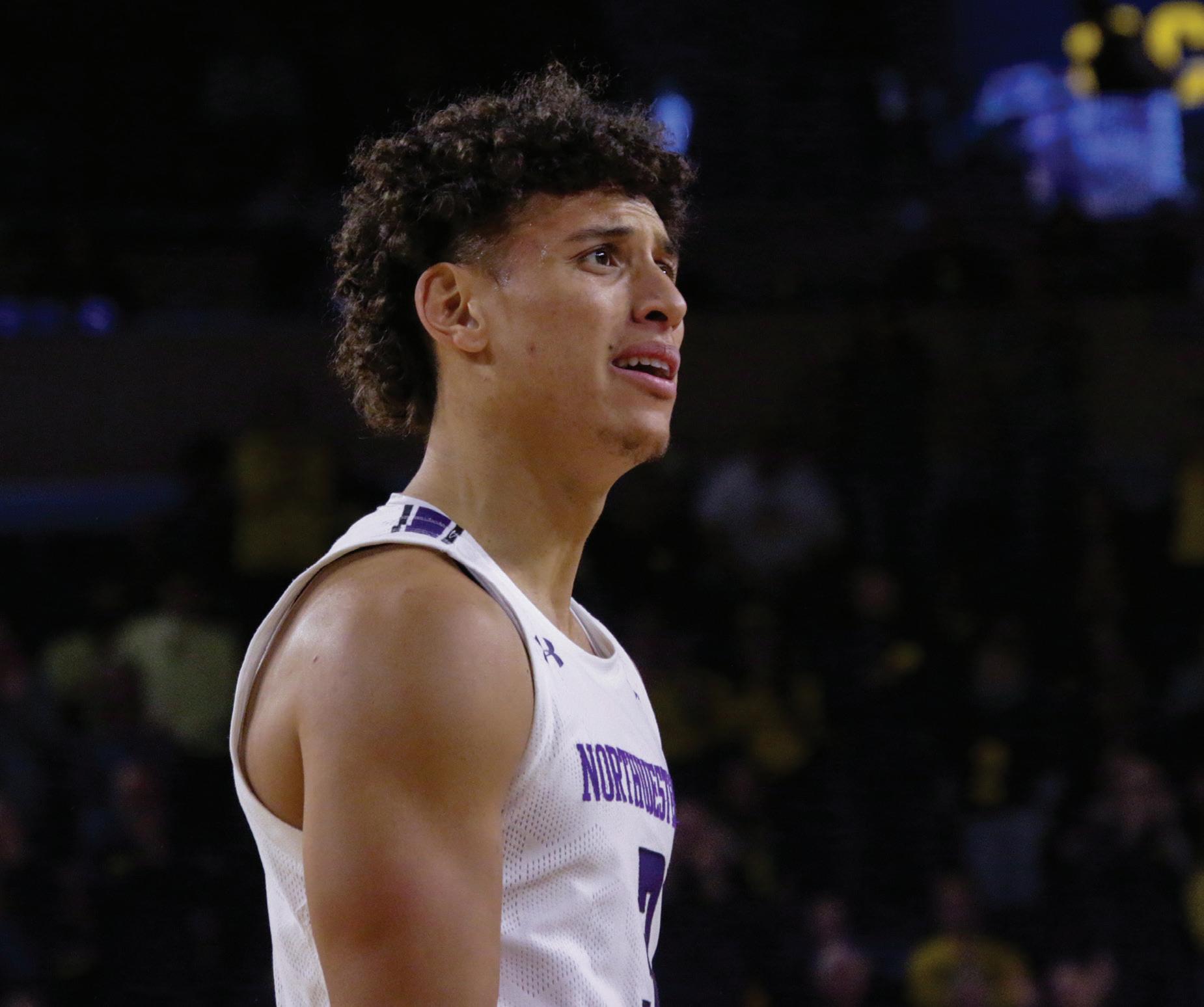
Ahead of Thursday, the Cats must ensure they silence Penn State senior guard Makenna Marisa and freshman guard Shay Ciezki. Marisa and Ciezki are the Lady Lions’ top two scorers this season: with 22 points each and averages of 18.4 and 11.1 points per game, respectively, NU’s blizzard zone defense must be at its A-game.
Thursday evening’s conference matchup is the true test on where NU stands in the Big Ten Conference as we dive deeper into the final stretch before the Big Ten Tournament and the NCAA Tournament. The Cats are aiming to have one of the, arguably, greatest comebacks of the conference.
skyeswann2024@u.northwestern.edu
SPORTS Thursday, February 2, 2023 @DailyNU_Sports
MEN’S BASKETBALL
alycebrown2025@u.northwestern.edu
Angeli Mittal/Daily Senior Staffer
Angeli Mittal/Daily Senior Staffer

 By LEXI GOLDSTEIN the daily northwestern @lexipgoldstein
By LEXI GOLDSTEIN the daily northwestern @lexipgoldstein


































 By EMILY LICHTY the daily northwestern @emilymlichty
By EMILY LICHTY the daily northwestern @emilymlichty






















